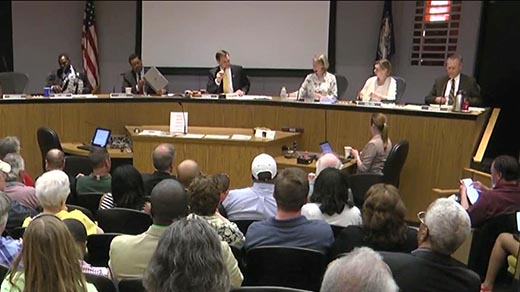ABOUT PATRICK SLEVIN: Patrick Slevin is a former Florida mayor. He is a two-time winner of the PRSA Silver Anvil Award of Excellence for Crisis & Issues Management. Influence Magazine named Slevin one of the "Great Communicators". Slevin has been recognized by Campaigns & Elections Magazine as one of the nation’s top political “Movers’ & Shakers". Mr. Slevin is the founder and head of Florida-based SL7 Consulting.
The following 10 Don’ts to Minimize Controversy is part of Patrick Slevin’s new presentation Crisis Leadership: How to Turn Controversial Development into Your Finest Hour. In his presentations and seminars, corporate leaders will learn "how-to" effectively Minimize, Maximize and Marginalize (3-M Methodology) the social factors that publicly threaten development and land use projects.
10 DON'TS TO MINIMIZE THE TARGET ON YOUR BACK
One of the first rules of crisis leadership is not making the current situation worse. It’s much like quicksand. The more you flail, the deeper you sink your project. If your land use project is in the heat of controversy, then this article will give you immediate practices where can effectively minimize the target that has been painted on your project’s back. Once you have accomplished the following 10 Don’ts, then you can go turn crisis into you finest hour.
1. Downshift the Project: Don’t let opposition sustain the mania with their hurry-up tempo. The opposition has created a controversy with negative media coverage, protests, petitions, demonstrations, toxic social media and public meetings. They have successfully antagonized elected officials who are now either advising you to take action, or worse, they have decided to get involved in mediating the crisis. This is the time to take a step back, slow down the process and regroup.
2. Diffuse the Time Bomb: Don’t rely upon the notice and hearing system. The system is fraught with ticking time bombs that favor obstructionists who are adept at blowing up the process.
What makes the notice and hearing system so dangerous to sustainable real estate projects is it creates the illusions of an application process that’s handled in a legal, logical and orderly fashion. However, when a real estate project becomes controversial, the reality of politics overrides the system with political, emotional and chaotic disruptions.
This is where applications get blindsided by the opposition. If at all possible, diffuse any attempts to engage the opposition in a public forum such as a workshop, town hall meeting or other venue. If you cannot get out of a pending public meeting, don’t worry about it. There’s proactive tactics available that will be outlined in a future article.
3. Town Halls: Don’t make a crisis worse by organizing a town hall meeting. Town hall meetings in the context of controversial land use projects often signal the kiss of death for many projects. From my research, roughly nine out of 10 town hall meetings turn into “Jerry Springer” episodes where obstructionists hijack the venue, torpedo presentations, and generate more negative publicity.
This scenario repeats itself thousands of times every year across the country, leaving elected officials scrambling for political cover and corporate developers going deeper into crisis mode. No doubt, there are successful town hall meetings, but in today’s economy, corporate leaders should expect more continuity, control and certainty over their investments. Investors and developers shouldn’t risk their investments by rolling the dice at town hall meetings.
Check out my timeless column in the National Real Estate Investor: Tips for Handling NIMBY Town Hall Meetings, published in 2010.
4. Anxious Officials: Don’t act on the advice of public officials who’ve become anxious over the controversy. At this point, they’re thinking about political cover and re-election. When the mayor or commissioner recommends you organize a town hall meeting, it’s for self-preservation purposes. Generally, they’re bombarded with calls, letters and emails from the same dozen or so antagonists, so they recommend a town hall, so they can appease angry constituents.
5. Public Sparring: Don’t verbally spar with the opposition in the news media: It will only feed the David vs. Goliath narrative in the newspapers. During this phase of the crisis, reporters are calling you late in the afternoon after nearly completing their stories vis-à-vis they gave the opposition primary position and frame on the front end of the story and you’re just filler.
Even though most of these local activists are being directed by DC-Centric special interests, you do not want to appear to be strong arming or insulting the elected officials’ constituents. Therefore, your quotes and comments are constructive, sensitive and optimistic about the project. This is how you cultivate corporate and community goodwill for your project – staying above the fray as much as possible.
6. King Solomon: Don’t mediate in the presence of the news media. Anti-development activists are savvy and they know that without media coverage, they essentially don’t exist. So, don’t give them another stage to undermine your reputation and project. Again, they have no intention of finding a win-win and they will do their very best to destroy you. Therefore, mediation has little upside to resolving crisis, other than optical assuagement with certain stakeholders.
7. Concession Trap: DON’T fall for the allure of making concessions as a means of climbing out of the crisis. In the majority of crisis situations, the more concessions you offer, the more concessions the opposition will demand. In other words, the opposition smells blood in the water, so it’s not in their best interest to help you find a win-win solution. They will relentlessly push for concessions with the pre-meditated intent of making your project fiscally unviable.
8. Falling Off the Grid: Don’t have a bunker mentality during the crisis. Most developers either stick their necks out to over accommodate the opposition or they go to the other extreme by falling off the grid. When developers go off the grid, it alienates those community leaders and influencers who remain supportive of the project. They need to see you and your team to be reassured that the conflict isn’t going to cause you to scuttle the project. This is very important, because they have neighbors asking them about the latest on the project. Moreover, they have the ears of the elected officials, so you need to keep them empowered, even when it gets ugly.
9. Local Operatives: DON’T hire local political and public relations consultants in times of crisis. You will find your return on investment to be at best nominal, at worst, compounding the crisis.
Political consultants are hired because they have access to local elected officials. These consultants are paid big bucks to lobby behind the scenes. However, these consultants won’t go that extra mile in times of crisis, nor will they risk burning a bridge with elected officials who are their gravy trains vis-à-vis re-elections. I know of one political consultant who turned down $50,000 retainer to lobby the mayor, the swing vote, because it would’ve cost him more to lose the mayor’s confidence over one project.
Additionally, most public relations shops are great at marketing, but they know little to nothing about land use development and local government.
10. Political Duress: DON’T put the fate of your project in the words of elected officials who are publicly against your project, but privately supportive of the project. Until you have mitigated the crisis and created bankable political capital, you cannot affirmatively count on ANY elected official who hasn’t publicly voiced support for your project. Too many applicants have been disappointed when elected officials are appeasing both sides.
CONCLUSION:
If you follow my 10 Don’ts during your current or future crisis, then you will see an immediate impact, for the better, during the first few hours, days and weeks of your crisis. It will give your project the best chance to quiet the controversy down to where you can now pro-actively and positively begin engaging community stakeholders, while garnering community goodwill.
NOTE: If you found this article helpful, please share it with friends, partners and colleagues.
-30-
For over 20 years, Patrick Slevin has successfully counseled C-Suite executives leading multi-nationals, trade associations, corporations and special interests who've faced billions of dollars of potential economic loss from man-made crises and natural disasters.
Mr. Slevin is a professional speaker and trainer offering his new ground-breaking presentation, CRISIS LEADERSHIP: HOW TO TURN CONTROVERSIAL LAND DEVELOPMENT INTO YOUR FINEST HOUR. Corporate leaders will learn modern-day methods offering reputable crisis leadership, credible communications and influential stakeholder engagement. Slevin breaks down his 3-M Methodology, arming corporate leaders, executives and land-use professionals with innovative practices that garner community goodwill during a crisis!
For over 20 years, Mr. Slevin has counseled real estate leaders across the industry!! He has spoken as keynote, featured and panelist speaker before real estate organizations including ULI, NAIOP, ICSC, CREW, BOMA APA, as well as builders, affordable housing, energy, chambers, EDCs, municipalities and corporations across the nation.
You can contact Mrs. Slevin at P.SL7@patrickslevin.com or 850.597.0423. For more information you can visit www.PatrickSlevin.com.










